
Journal fur Kardiologie
Scope & Guideline
Nurturing Progress in Cardiovascular Medicine.
Introduction
Aims and Scopes
- Cardiovascular Imaging and Diagnostics:
The journal emphasizes the importance of advanced imaging techniques such as echocardiography, cardiac MRI, and CT angiography for accurate diagnosis and management of heart conditions. - Heart Failure Management:
A significant focus is placed on the evaluation and treatment of various forms of heart failure, including advanced heart failure therapies and the role of devices such as left ventricular assist devices (LVADs). - Valvular Heart Disease:
Research on the diagnosis, treatment, and management of conditions affecting heart valves, including aortic stenosis and mitral valve disorders, is a core area of interest. - Interventional Cardiology:
The journal covers advancements in interventional procedures, including percutaneous coronary interventions (PCI), and discusses the latest guidelines and techniques. - Cardiomyopathy and Arrhythmias:
The study and management of various cardiomyopathies and arrhythmias, including their pathophysiology, diagnosis, and treatment options, are frequently addressed. - Emerging Therapies and Pharmacotherapy:
The journal explores new pharmacological treatments and therapeutic strategies in cardiology, focusing on their efficacy and safety in clinical practice. - Guideline Updates and Recommendations:
Regular updates on clinical guidelines from leading cardiology organizations are provided, helping practitioners stay informed about best practices.
Trending and Emerging
- Artificial Intelligence in Cardiology:
The incorporation of artificial intelligence and machine learning in cardiovascular imaging and diagnostics is increasingly highlighted, showcasing its potential to enhance accuracy and efficiency in clinical practice. - Heart Failure with Preserved Ejection Fraction (HFpEF):
Research on HFpEF is gaining momentum, reflecting the need for better understanding and management strategies for this complex condition. - Integrated Care Models for Cardiovascular Disease:
There is a growing interest in multidisciplinary approaches to managing cardiovascular diseases, emphasizing collaboration between cardiologists, primary care, and other specialists. - Personalized Medicine and Genomics:
Emerging topics around personalized medicine, including genetic risk factors and tailored therapies for cardiovascular diseases, are becoming more prominent in recent publications. - Long-COVID and Cardiovascular Implications:
Research exploring the cardiovascular effects of long-COVID is on the rise, focusing on the long-term health consequences for patients recovering from COVID-19.
Declining or Waning
- Traditional Risk Factor Management:
There appears to be a waning emphasis on traditional cardiovascular risk factors management (such as diet and exercise) in favor of more advanced pharmacological interventions and technological solutions. - Basic Science Research:
Publications focusing on basic science aspects of cardiology, such as molecular biology or genetic studies, have decreased, possibly due to a shift towards clinical applications and translational research. - Surgical Techniques:
There has been a noticeable reduction in articles discussing conventional surgical techniques, as less invasive methods and interventional approaches gain more attention. - Historical Perspectives and Case Reports:
The journal has seen fewer publications that focus on historical perspectives of cardiology or detailed case reports, indicating a shift towards more standardized research and guidelines. - Telemedicine in Cardiovascular Care:
While initially a growing theme, the focus on telemedicine has diminished as the immediate need for telehealth solutions has stabilized post-pandemic, leading to less frequent dedicated publications in this area.
Similar Journals

Kardiologie
Pioneering Insights for the Future of Cardiology.Kardiologie is an emerging journal dedicated to advancing the field of cardiology and cardiovascular medicine, published by SPRINGER HEIDELBERG in Germany. Established with the first issue in 2022, this journal provides a valuable platform for the dissemination of innovative research, clinical studies, and review articles that contribute to both theoretical knowledge and practical applications in cardiology. While the journal currently holds a Q4 category ranking in the field and occupies a percentile of 24 according to Scopus, it aims to enhance its impact factor by attracting high-quality submissions from researchers and clinicians alike. Kardiologie is particularly focused on bridging the gap between cutting-edge research and clinical practice, ensuring that the latest scientific findings are readily accessible to practitioners. Though it operates under traditional access options at present, the journal aspires to broaden its accessibility and reach in future editions, making it a pertinent choice for anyone interested in the evolving landscape of cardiovascular health.

CANADIAN JOURNAL OF CARDIOLOGY
Empowering Cardiovascular Innovations Through Rigorous ResearchCanadian Journal of Cardiology (ISSN: 0828-282X, E-ISSN: 1916-7075), published by Elsevier Science Inc, serves as a vital platform for disseminating high-quality research in the dynamic field of cardiology and cardiovascular medicine. Since its inception in 1985, this journal has established itself as a leader in the field, currently holding a prestigious Q1 ranking in Cardiology, indicating its significant impact and contribution to medical science. With a Scopus rank of #50 out of 387 in its category and placing in the 87th percentile, the journal showcases rigorous peer-reviewed articles that advance knowledge and practice in cardiology. Although the journal is not open access, it provides valuable insights and research findings that cater to clinicians, researchers, and students who are committed to improving cardiovascular health. As we approach the convergence of years to 2024, the Canadian Journal of Cardiology continues to strive for excellence, facilitating a discourse vital for both academic and clinical advancements in cardiology.

Revista de la Federacion Argentina de Cardiologia
Fostering collaboration to enhance cardiovascular care.Revista de la Federacion Argentina de Cardiologia is a vital publication in the field of Cardiology and Cardiovascular Medicine, providing a platform for researchers and healthcare professionals to share significant findings and innovative concepts since its inception in 2012. Published by the Federacion Argentina Cardiology, this journal specifically addresses contemporary issues and advancements within cardiology, contributing to the scholarly dialogue essential for improving cardiovascular health. Despite being categorized in the Q4 quartile for 2023 and presently ranking #358 out of 387 in its field, the journal remains committed to fostering academic inquiry and disseminating valuable research for both local and global audiences. Although it is not an open-access journal, it strives to balance accessibility with rigorous academic standards, ensuring quality contributions that are critical for practitioners and students alike. The journal’s ongoing evaluation and adaptation in the ever-evolving landscape of cardiology underscore its importance in advancing cardiovascular science and practice.
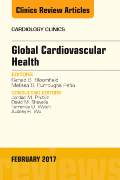
CARDIOLOGY CLINICS
Advancing cardiovascular knowledge for a healthier tomorrow.CARDIOLOGY CLINICS is a prestigious journal published by W B SAUNDERS CO-ELSEVIER INC, offering insightful and comprehensive reviews in the field of cardiology and cardiovascular medicine since its inception in 1983. With its ISSN 0733-8651 and E-ISSN 1558-2264, the journal has established a significant impact factor within the academic community, holding a Q2 ranking in both Cardiology and Cardiovascular Medicine as well as in Medicine (miscellaneous) for 2023. Located in the heart of Philadelphia, USA, it serves as a vital resource for researchers, clinicians, and students seeking to deepen their understanding of cardiovascular diseases and advancements in treatment. Although it operates under a traditional subscription model, the journal remains committed to disseminating valuable knowledge that shapes current practices and informs future research directions. As it converges towards its 2024 issues, CARDIOLOGY CLINICS continues to play an influential role in enhancing the discourse on cardiovascular health worldwide, ensuring that its audience stays at the forefront of clinical and scientific developments.
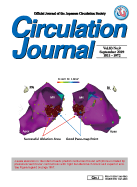
CIRCULATION JOURNAL
Connecting Global Insights in Cardiology and Medicine.CIRCULATION JOURNAL, published by the Japanese Circulation Society, stands as a premier platform for cutting-edge research in the fields of Cardiology and Cardiovascular Medicine. With an impressive impact factor placing it in the Q1 quartile for both cardiology and general medicine, this journal is essential for researchers and practitioners seeking to stay at the forefront of cardiovascular science. The journal's accessible open access options ensure that groundbreaking studies are widely disseminated, reflecting its commitment to advancing medical knowledge and improving patient care. Since its inception in 1996, CIRCULATION JOURNAL has fostered a global dialogue on vital cardiovascular issues, making it a vital resource for academics, healthcare professionals, and students alike. With its base in Tokyo, Japan, the journal not only highlights regional advancements but also contributes significantly to the global medical community.

Pakistan Heart Journal
Connecting Ideas, Transforming Cardiovascular Care.Pakistan Heart Journal, with the ISSN 0048-2706 and E-ISSN 2227-9199, is a premier publication by the Pakistan Cardiac Society, dedicated to advancing the field of cardiology and cardiovascular medicine. Established as an Open Access journal since 2011, it provides a valuable platform for researchers and clinicians to disseminate innovative findings and insights within this critical area of health. Based in Karachi, Pakistan, at the National Institute of Cardiovascular Diseases, this journal aims to foster an enriched understanding of cardiovascular health by publishing rigorous research, case studies, and review articles. Despite its current categorization as Q4 in the latest 2023 quartiles and a rank of 357/387 in the Scopus database, it plays a vital role in the academic community, encouraging collaborative efforts and dialogue among professionals. The journal aspires to converge diverse perspectives and innovations in cardiology from 2019 to 2024, thereby enhancing the quality and scope of cardiovascular research in the region and beyond.
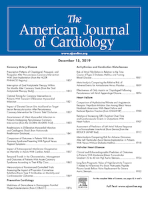
AMERICAN JOURNAL OF CARDIOLOGY
Elevating Standards in Cardiovascular Research and PracticeThe American Journal of Cardiology is a leading peer-reviewed journal in the field of Cardiology and Cardiovascular Medicine, published by Excerpta Medica Inc-Elsevier Science Inc. Since its inception in 1958, the journal has consistently contributed to the advancement of cardiovascular research, providing a platform for groundbreaking studies and clinical findings that shape modern medical practices. With an impressive impact factor placing it in the Q1 category in its field for 2023, it ranks among the top journals in medicine, with a rank of #155 out of 387 in the Scopus database, reflecting its significance and rigorous editorial standards. The journal is committed to disseminating high-quality research that fosters innovation and enhances clinical outcomes in cardiology. Although it does not provide Open Access options, the American Journal of Cardiology remains an essential resource for researchers, healthcare professionals, and students looking to deepen their understanding of cardiovascular health.
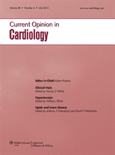
CURRENT OPINION IN CARDIOLOGY
Exploring the forefront of cardiovascular innovation.CURRENT OPINION IN CARDIOLOGY, published by LIPPINCOTT WILLIAMS & WILKINS, is an esteemed journal in the field of cardiology that has been serving the academic community since 1988. With a robust focus on the latest developments and emerging trends in cardiovascular medicine, this journal aims to bridge the gap between clinical practice and research, offering critical insights and expert commentary. The journal is recognized in the medical community, achieving a 2023 Scopus rank of #148 out of 387 in its category, placing it in the 61st percentile. Although it operates under a subscription-based model, CURRENT OPINION IN CARDIOLOGY remains an essential resource for researchers, practitioners, and students seeking cutting-edge knowledge and advancements in cardiology. As a Q2 journal in the field, it continues to foster dialogue and provide a platform for disseminating impactful cardiovascular research, ultimately contributing to improved patient outcomes and informed clinical decisions.
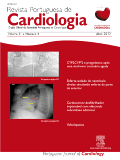
Revista Portuguesa de Cardiologia
Empowering the fight against heart disease through open access research.Revista Portuguesa de Cardiologia, published by Elsevier España SLU, stands as a pivotal resource in the realm of Cardiology and Cardiovascular Medicine. With its origins tracing back to 1970, this journal has cultivated a robust academic presence, achieving a 2023 Q3 ranking in its category, and currently holding a position of #220 out of 387 on the Scopus rankings, placing it within the 43rd percentile of its field. This open access journal, available since 2011, aims to disseminate high-quality research and insights relevant to contemporary cardiovascular issues. Its commitment to accessibility and knowledge exchange enhances its importance for clinicians, researchers, and students alike, fostering a more informed community in the fight against cardiovascular diseases. Operating from its base in Barcelona, Spain, the journal welcomes contributions that further the understanding and treatment of heart conditions, contributing significantly to the advancement of cardiovascular health.
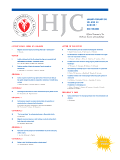
Hellenic Journal of Cardiology
Pioneering Insights in Cardiovascular Health Since 1993The Hellenic Journal of Cardiology, a peer-reviewed open-access publication under the esteemed ELSEVIER banner, proudly represents the forefront of research in the field of Cardiology and Cardiovascular Medicine. Established in 1993 and actively publishing since then, this journal has carved a niche in disseminating high-quality research and clinical insights relevant to cardiovascular health in Greece and beyond. With an impressive Q2 ranking in both Cardiology and Cardiovascular Medicine categories as of 2023, the journal holds a commendable position at Rank #126/387 in Scopus, indicative of its critical role in advancing scientific knowledge and practice. The Hellenic Journal of Cardiology transitioned to open access in 2016, ensuring that ground-breaking research is freely accessible, fostering a global dialogue among researchers, clinicians, and students alike. Its publication frequency spans significant years, providing a continuous flow of innovative findings while addressing pressing cardiovascular issues. As the journal builds on its legacy, it aspires to enrich the academic community's understanding of cardiovascular medicine, making it an invaluable resource for anyone invested in heart health.